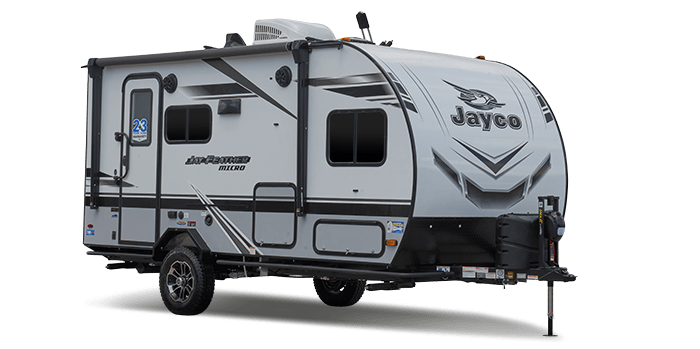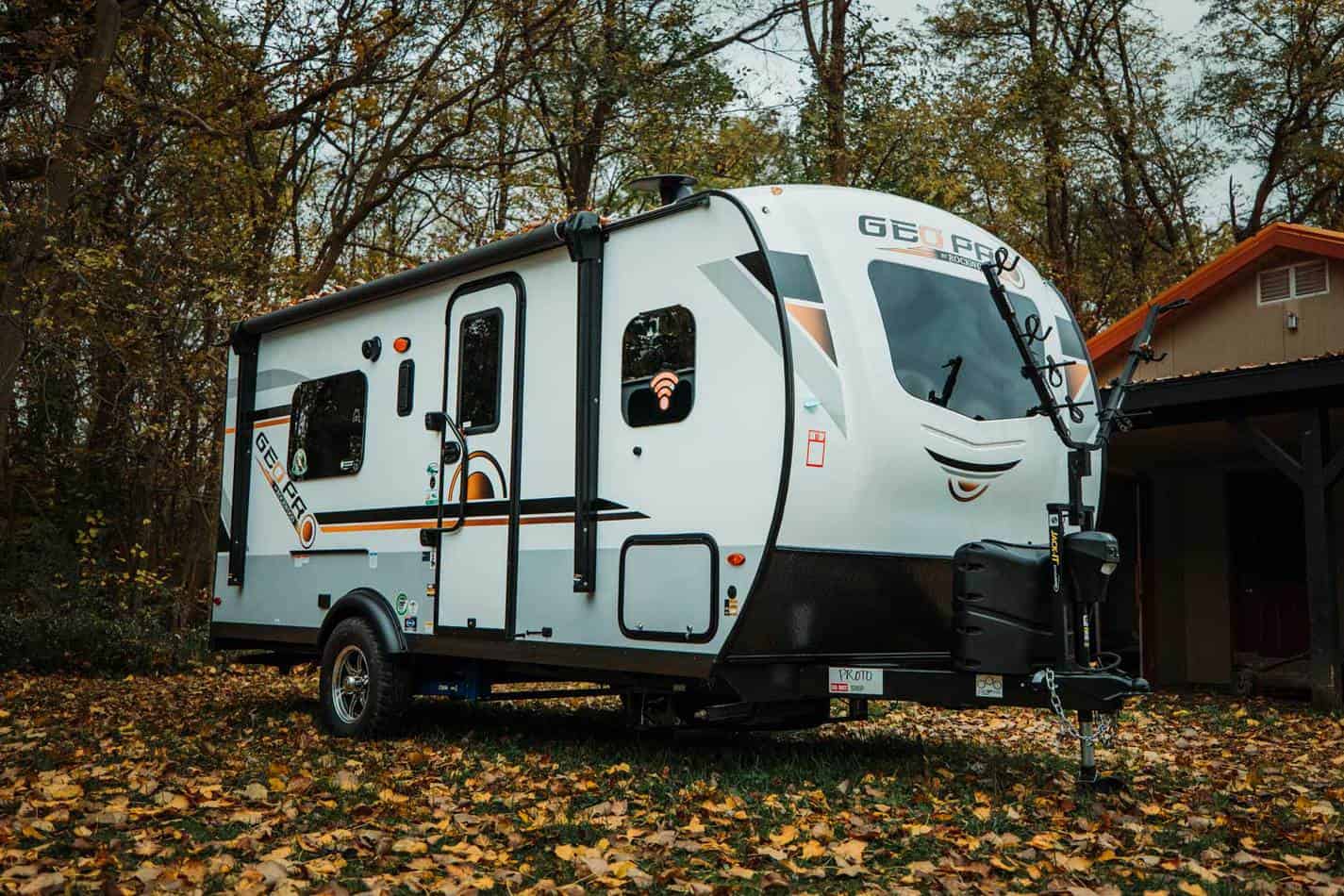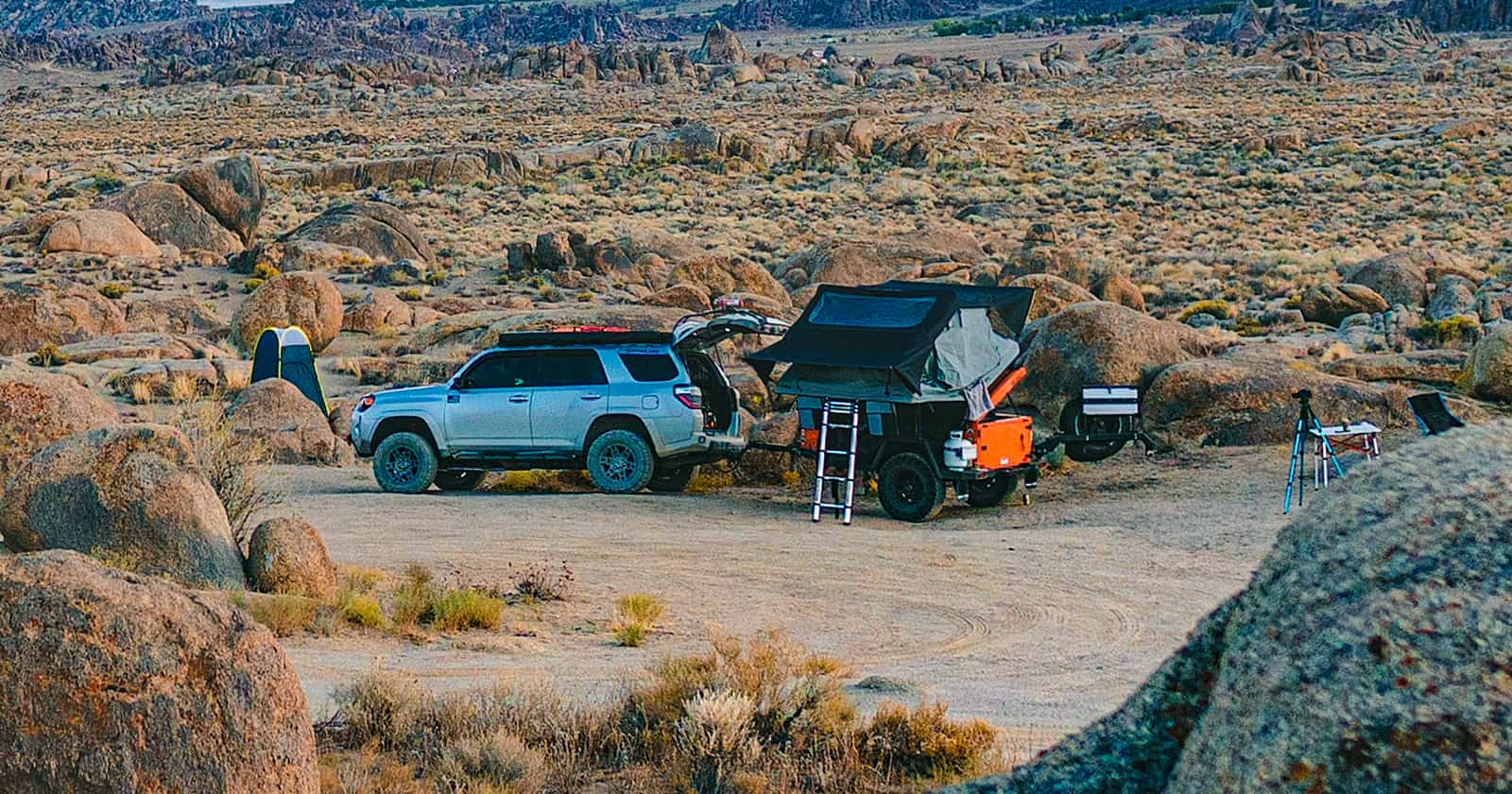Finding the right off road travel trailer can be a daunting task. Here, we look at two leading candidates designed to make your weekends more enjoyable. Having the flexibility of going off the beaten path means you need the best off road travel trailer available to get you down to the water’s edge, deep into the forest, or up to the rolling hills. We’ll compare the Forest River Geo Pro (marketed under the Rockwood brand) and the Jayco Jay Feather Micro.
Best Off Road Travel Trailer Candidate #1 – Rockwood Geo Pro
Forest River has created an aluminum-framed off-road travel trailer under 5,000 pounds. The RV is SUV-friendly at the mid-size level. You won’t have a problem towing it with your Toyota Highlander or Chevrolet Traverse. The teardrop version of the Geo Pro camper price sits below $15,000, while the self-contained travel trailers are between $25,000-$30,000 for new models.
The company focused the coach toward Millennials that enjoy exploring the outdoors and the variety of nature activities. The travel trailer series has technological features geared towards balancing their online presence with their unplugged life. You’ll find plenty of ways to store everything you need in the bays and the coach itself through side and rear utility doors.
By offering the RV under the Rockwood and Flagstaff E Pro Brands, consumers could choose between different interior themes. Both versions have a contemporary white interior. The white wood, flooring, and other base palette surfaces give the interior a spacious feel. The beige or grey accent pieces like furniture cushions, bedspreads, framing, and other features keep the interior provides the travel trailer a clean contemporary look prized by many residential homeowners.
Best Off Road Travel Trailer Candidate #2 – Jayco Jay Feather Micro
Until 2020, Jayco offered the Hummingbird series for its small travel trailer and teardrop consumer base. As sales declined, they knew they needed a competitor that could stand toe-to-toe with Forest River’s Geo Pro. In early 2020, a select group of RV dealers was allowed to look at the 2021 Jay Feather Micro prototype. Even without officially publishing the official specs, the dealers were excited about this new series from Jayco.
You could see that this new travel trailer series had the “goods.” Whether standard or optional, the Jay Feather Micro features are brand new to the small off-road travel trailer sector. An outdoor bay with a dorm-sized refrigerator and a front rail on both sides for reaching your equipment on the roof add to the RV’s utility.
The interior designers went a completely different direction to give the series a spacious look. You’ll see warm tones that adhere to the vintage grey or modern farmhouse design styles. Most of the wood used is a dark, almost mahogany look. The kitchen cabinets use a medium to light stain color to give a separation of sections.
Why Compare the Geo Pro and the Jay Feather Micro?
When you compare the Geo Pro to the Jay Feather Micro, they’re virtually the same to the untrained eye. You’ll find that the Jayco Jay Feather Micro’s price mirrors the Geo Pro. The competition between Forest River and Jayco is so tight, the two gain market share by the small differences found within their features. It’s like the competition between McDonald’s and Burger King. Both offer hamburgers, but it’s the toppings, preparation, and few penny-price difference that helps you choose which drive-thru you enter.
What also makes these two series unique are the differences in their models. Rarely do the Big Four (REV Group, Forest River, Thor Industries, and Winnebago Industries) bother with the teardrop category. For them, the cost of production (COP) versus the return on investment (ROI) isn’t worth the expense. In other words, they don’t make enough off of teardrops to invest in making them.
Yet, the Geo Pro and the Jay Feather Micro have non-traditional (not in the classic shape) teardrop models. Both series are considered entry-level to mid-level travel trailers. Ideally, first-timers, weekenders, or part-time RVers gravitate toward both units. Within 3-5 years, a significant portion of these RV owners may upgrade to a toy hauler or other RV, per market trends.
RVers tend to become loyal to particular brands. We don’t tattoo ourselves with company logos, like Harley Davidson enthusiasts (although I’m sure RV executives would love that). Still, it’s uncommon for a Forest River customer to jump the fence to Jayco and vice versa. RVs become members of the family after a while. You depend on them when you’re camping and become used to their various features. It’s similar to car brand loyalty.

Comparing the Geo Pro and the Jay Feather Micro
Here are some common features and issues that differ between the Geo Pro and Jay Feather Micro. We mentioned some of them above, but we want to give you a side-by-side comparison based on real concerns. The topics we highlight come from consumers and experts who have pointed them out on forums like iRV2, Social Media, and blog feedback.
Age: The Geo Pro has had four years to work out all design flaws and adapt to consumer feedback. When the Jay Feather Micro came out for 2021, Jayco did it right by having RV dealers and consumer focus groups run through the prototype from stem-to-stern before it’s release. Forest River did something similar, but you see many feedback changes between the first and second years of new models in the RV world.
Axle: Both the Geo Pro and Jay Feather Micro have Dexter® Torsion axles. You’ll see this a lot in the RV industry. Many of the RV manufacturers use the same vendors for various parts.
Both coaches are high clearance travel trailers designed for off-road performance. The torsion axles give the campers a better and quieter road handling performance since the rubber tubing inside takes the punishment instead of metal-on-metal leaf springs. Airstream was one of the first to use torsion axles dating back to the 1940s.
Bathroom: Small travel trailers can be called the “tall person’s sorrow” trailer, especially in the shower. Taller women and men will feel more comfortable in the Jayco since the sunroof in the shower is slightly higher than the Geo Pro. LeBron James will have to crouch down, either way, but he has plenty of headroom if he buys a multi-million dollar Anderson RV.
Bedroom: The Jayco offers double-sized bunk beds, and the Geo Pro has a twin and double-size versions. Jayco has queen and murphy queen beds. Forest River varies the travel trailers with a full, queen, and murphy queens depending on the floorplan. The smallest self-contained Geo Pro has a dinette that converts to either dual twin-beds or a full-width king bed. The teardrop versions have sofas (or gauchos) that convert to queen-size beds in both brands.
Jayco gives three models privacy curtains for the master bed. The teardrop and murphy bed model doesn’t have it for obvious reasons. The Geo Pro doesn’t come with any type of privacy curtain or door on its models. If you would like this feature, talk to your RV dealer; they may be able to install an aftermarket curtain.
Floorplans: If you’re looking for variation, the Geo Pro races ahead. Forest River offers two toy haulers, two teardrops, and nine travel trailers. Jayco has one teardrop and four travel trailers.
Holding Tanks: As off-grid trailers, both models are excellent choices. Many first-time dry campers neglect their water limitations until they turn on the faucet and nothing comes out. The Jay Feather Micro has a 55-gallon freshwater tank, and the Geo Pro’s tank increased from 27 to 31 for 2021. Both coaches have 30-gallon grey and black tanks.
The Geo Pro comes with a water miser saving feature that regulates the amount of water that comes through the shower to help with water-saving. It will feel like a full shower because it decreases the amount of water and increases the pressure.
If you’re going off-grid, always bring a few water jugs and portable holding tanks with you. When you need to cycle your tanks, you can safely transport your wastewater to a nearby dump station and use the jugs to bring back clean water. Dumping illegally comes with hefty penalties or worse.
Kitchen: Bakers, roasters, and chefs lend me your ears. Small travel trailer kitchens won’t match up to gourmet kitchens in 40-foot fifth wheels, but you can make some delicious meals with what you do have. Some of the Geo Pro floorplans come with propane stoves and ovens. Others have a convection microwave to substitute your oven needs. The Jay Feather Micro only comes with a stove and convection microwave.
The Geo Pro’s refrigerators are 5-6 cubic feet three-way units. The Jay Feather Micro comes standard with a three-way 6 cubic foot refrigerator with the option to upgrade to an 8 cubic foot 12-volt compressor model.
Both RVs come with an outdoor griddle that hookups to the quick connect propane line next to the entry door. Jayco has two models (the 166FBS and the 199MBS) to Forest River’s one (16BH) with an exterior dorm-size fridge.
Measurements: The Jay Feather Micro measures between 13-22 feet in length and weighs between 1,500- 4,500 pounds dry weight. The Geo Pro is 11.3 to 21.2 feet in length and has a dry weight of 1,250-3,500 pounds. The Geo Pro is generally lighter when you compare it to an evenly matched Jayco version.
Be Sure to Ask for the Off Road Option
Off-Road Capability: Both the Geo Pro and Jay Feather Micro come standard with on-road suspension. The off-road suspension, tires, and other companion parts come as an optional package. The popularity of the package has enticed RV dealers to order units with it directly from the factory.
Roof: Both travel trailers have vaulted roofs. The Geo Pro has a bit of a sharper incline, so stay low and walk slowly when you’re up there securing your cargo. Both RVs have sturdy roofs, but the Jayco brand does hold more weight. If you have a heavier adventure toy your strapping on the top, that’s when you may see an advantage.
Storage: The 166FBS Jay Feather Micro has an off-door coach that doesn’t offer any storage. Due to maximizing usable space, the sofa covers the wheel well. For most people, this isn’t a problem. Otherwise, both RVs make great use of storage space. You’ll see a lot of strategic storage space under the master bed and dinette.
The Geo Pro 19BH has a secondary door on the off door side towards the back. Besides an emergency exit (or your teenager’s escape route- check out our feature on RV security systems to help catch them), the door’s primary function is for utility purposes. You can feed your bikes or other oversized items through the door. The bottom bunk folds up to make space.
Technology Features: Both RV manufacturers made these RV lineups to target the techno-savvy Millenial Generation. A lot of the primary and secondary features are assumed expectations for this generation. Secondary features include all three electrical outlets: Circular DC, 110v, and USB charging ports.
In the Jayco, you’ll find the main LED TV has a built-in soundbar, Bluetooth multimedia system, and the JAYSmart App control system. There’s also prewiring for data and solar systems.
The Geo Pro comes standard with a Wifi Ranger data router, 100-Watt solar panel, and a 1,000-Watt inverter. Some of these features are options on the Jayco. Those that prefer to add their favorite tech brand equipment may choose not to have these features included on their travel trailer.
Towability: The average width of a mid-size SUV ranges from 7- 7 ½ feet. The Geo Pro measures 7.4 feet, and the Jay Feather Micro is two inches wider. You shouldn’t need to add extended side mirrors to see around the travel trailers in either case. Both coaches come prewired for backup cameras, which is always a good idea.
The Geo Pro’s wheels sit under the trailer, and the Jay Feather Micro places the wheels on the outside of the coach’s frame. The school of thought that prefers the wheels outside the frame feels that this method adds stability under sway conditions. Jayco reinforces the fender, so it doubles as a step when attaching things to the roof rack.
The under trailer wheel technique keeps everything flush, so you don’t have to worry about those extra inches that stick out from the coach itself. Modern sway control equipment does an excellent job of keeping your travel trailer behind your tow vehicle. We always recommend taking an online RV training course, regardless of the RV you purchase, to learn the towing expert tips from masters of the road.
Used: If you’re looking to save thousands of dollars by buying a used off-road trailer for sale in the USA, you’ll have better luck finding a Geo Pro or E Pro than a Jay Feather Micro. Since the Geo Pro/E Pro has a four-year advantage on the Jayco series, you may find great deals on RVT for the 2017 premier year and newer.
If you have your heart set on a Jayco Jay Feather Micro for sale on the used market, you may have to wait a couple of years because the RV manufacturer launched it for the 2021 model year. Whenever you buy a used RV, make sure you have an inspection checklist with you so you’re not surprised by the unexpected.
Weight: When you compare evenly matched models side-by-side, you’ll find that the Jay Feather Micro is heavier than the Geo Pro. If you have a tow vehicle with a maximum tow capacity with a big gap between the RV’s gross vehicle weight rating (GVWR), this is a non-issue. If your vehicle has less than a 1,000-pound gap, now you have to think wisely.
Consider the weight of your gear, personal items, passengers, and the horsepower you need for the road. If you must have a Geo Pro or Jay Feather Micro (who can blame you), stepping down to a lighter floorplan may be the way to go. Packing smartly and leaving some things behind to lighten the load helps, too. If possible, never travel with a full fresh water tank. Half or a third is enough for safety and the bathroom. Water weighs 8.34 pounds per gallon. That’s a lot of weight you can shave down.

What is the Best Off Road Travel Trailer? Jayco VS. Forest River
Both brands have shown up on award lists from top authorities in the industry. The two RV lines are a part of the best off-road travel trailers for 2021. When it comes to balancing interior comfort, durability required for off-road punishment, and operating off-grid, they compete at the highest levels.
Whether you buy Jayco or Forest River, join popular RV owner forums for both brands to learn more and enhance your RV ownership experience. Visit Forest River Forums or the Jayco Owners Forum.
Before you invest in your RV, try renting an RV from Outdoorsy. Renting allows you to gain the firsthand experience of trying it out. You can avoid buyer’s remorse and find out if the travel trailer matches up to your lifestyle. When you’re ready to buy, you’ll have the experience and the Camper Smarts to buy confidently.
About the Author
Although he’s from Motown, Brian is a legacy RVer that grew up on I-75. He, his wife, and three working-class fur-babies have enjoyed the full-time RV lifestyle since 2017. Like John Madden, he hasn’t “worked” in years because he gets to write about his passion. When he’s not working, he supports his daughter’s dog rescue efforts and disability causes. Learn more with him on CamperSmarts.com


